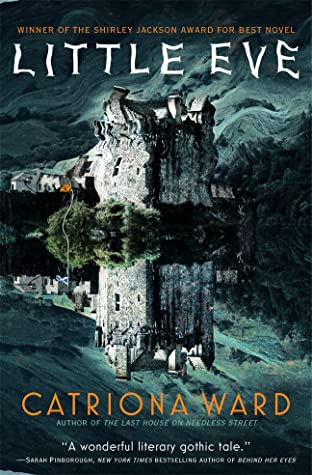
Little Eve by Catriona Ward
Catriona Ward upended the horror scene with her 2021 novel The Last House on Needless Street. It was the first of her books that I had read for review and, man, the way the story was told defied the basics of its narrative. It was a tour-de-force in terms of misdirection. The author expertly planted twists in the tale while revealing the inner workings of the fragile, and seriously twisted, characters. Riotous praise for the book rightfully ensued.

When I was subsequently offered a copy of Little Eve, Ward’s Shirley Jackson Award winning novel which was originally published in 2018, I seized the opportunity. Little Eve had debuted in the U.K. and won the Shirley Jackson as well as the British Fantasy Award that year. Now, Nightfire Books has published the first U.S.A edition. Ward’s intro in the reprint states that winning the prestigious awards for, this, her second book inspired her to continue writing. Therefore, without that inspiration, it could be construed that The Last House on Needless Street might never have been written. But there’s a sort of symbiotic relationship between Little Eve and The Last House on Needless Street that goes beyond that. Both books deal with illusion and delusion and brilliantly showcase Ward’s literary legerdemain.
Little Eve is a far more Gothic story, set on a remote Scottish Isle plagued by hostile weather and inhabited by people with volatile dispositions. While The Last House on Needless Street dipped toes into Emily Brontë territory by referencing a bit of Wuthering Heights, Little Eve submerges itself into Brontë’s dark romantic sensibilities. This Gothic motif isn’t the only thing both books have in common. There is a shared commonality of unreliable narrators.
Which makes neither of these two examples of Ward’s writing easy reading. In each, the questionable validity of narrations causes the reader to be suspicious of the characters’ reportage. Points of view rendered with a metaphorical dose of hallucinogens. And in Little Eve, the whiplash shifts in time periods can be challenging. But that’s all part of the mental stimulation. Beach reads, these are not.
The Great War, and to a lesser extent, World War II come into play as backdrop to the action in Little Eve. Women fending on their own or relying on men who weren’t able or honorable enough to serve. Into such a universe, a charismatic male figure could exert tremendous control over vulnerable females. Or simply anyone feeling abandoned or disenfranchised. Playing upon such vulnerabilities, a cult of personality can harness a fearsome power. The control by the cult’s leader is heightened by the isle’s isolation from the inland community. He can extract pain and randomly abuse those in his thrall, without outside intervention. His followers shower him with sustenance while they waste away from hunger and neglect.
In Little Eve, Catriona Ward weaves a tapestry depicting damaged individuals whose lives become inextricably intertwined. Horrible events bind them together, as illustrated by the relationship between the titular Eve and the obsessed Inspector Black, a dogged policeman driven by personal demons. He and Eve intellectually torment each other over the course of years. When Black first meets Eve, he performs an amateur magic trick, demonstrating playful deception. Over the course of time, he keeps attempting to give her rational explanations when she veers towards the irrational. The couple are together at the book’s excellent denouement, reunited on her turf.
While there is a whiff of the supernatural in the novel, it is employed to create mood or to highlight a character’s state of mind. When mulling about what example of Ward’s prose to use as a sample of her style, I settled on one that invokes images of both the unearthly and earthly: “They hopscotch through bright puddles of sunlight that fall in through the decayed roof. It is easy to imagine that the dead are lurking in dark corners. That a murderer stalks their footsteps, slipping from shadow to shadow. That eyes peer out from under the rotting stairs. That a shape, too thin and sharp to be human, stirs in the depth of the great hearth.”
It is grand that Nightfire Books has brought Little Eve to a larger readership. I consider it a companion piece to The Last House on Needless Street, solidifying Catriona Ward’s place in horror fiction as “The Mistress of Marvelous Misdirection.”

